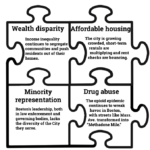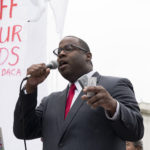
The Massachusetts Bay Transportation Authority launched on Wednesday the Movement for Access Safety and Survivors, an anti-sexual harassment campaign that promotes passenger safety and the reporting of sexual harassment incidents, according to a Thursday press release.
The MBTA partnered with the Boston Area Rape Crisis Center, the Boston Center for Independent Living and the MBTA Transit Police to implement the MASS Collaboration, which emphasizes the needs of people with disabilities, the release stated.
Shelley Yen-Ewert, the organizational development and learning director of BARCC, said the campaign is part of a series of collaborations between the MBTA and BARCC that began in 2008.
“The purpose of all of these campaigns, including this one, is to let riders know that they should expect a safe ride on the T, that riders can create a safer T environment by acting when they witness sexual harassment, and that there is support for survivors and witnesses at both the transit police and at BARCC,” Yen-Ewert said.
Beth Molnar, the president of the BARCC board of directors and a health science professor at Northeastern University, said people with disabilities can play an active role in being onlookers of their surroundings, reporting incidents of sexual harassment.
“Even though there is twice as much victimization among people with disabilities than people without, there’s also a powerful role people with disabilities can play in being bystanders and reporting what they see happening on the T around them,” Molnar said.
Karen Schneiderman, an advocate at BCIL, said the collaboration was initiated by the BARCC after findings from grant research they conducted showed that people with disabilities are twice as likely to be sexually assaulted on public transportation compared to people without disabilities.
“Most people don’t think of people with disabilities as being sexually assaulted because they don’t think of us as being sexual people,” Schneiderman said. “You can’t determine who’s going to be assaulted based on what they look like, if they’re pretty or handsome or they’re not considered pretty or handsome, that’s not the issue, it’s the behavior of the alleged perpetrator.”
Schneiderman said although the campaign will not be a fast process, it will nonetheless amplify awareness of the issue among Boston residents.
“It’s not going to be a quick thing,” Schneiderman said. “Slowly over time the culture will understand that this is a very serious problem and that it’s not an anomaly.”
Several Boston residents said although they have heard of sexual assault instances on the T, they said they were unaware that disabled people are at higher risk.
Sunita Desai, 29, of Back Bay, said although she has not experienced sexual harassment on the T, she said the issue needs to be addressed.
“It’s pretty shocking and terrible,” Desai said. “Any initiative to crack down on it, especially when it comes to handicapped individuals, is very important.”
Brenda Elliott, 48, of Kenmore, said she supports the initiative’s focus on people with disabilities, and that people should report sexual harassment incidents when they witness them.
“I feel really great,” Elliott said. “I am disabled and we need to be aware that people are doing this, and it’s disgusting, and so I think this is a good thing.”
Kellie Fuss, 25, of Fenway, said the campaign is beneficial for raising awareness on sexual harassment cases.
“A lot of people don’t know about it, if I didn’t know about it and I take the T a lot, who’s to say that a lot of people don’t know about it,” she said. “If it does actually work, then I think maybe it’ll bring attention to it, and people will be more aware of what’s going on around them, and maybe stand up for other people.”
A previous version of this story said people with disabilities are twice as likely to be sexually assaulted on public transportation rather than just people with disabilities are twice as likely to be sexually assaulted. This correction is reflected in the story above.





Well, now I know to keep an eye out. I have been riding the T for many years, and never realized this was a problem.